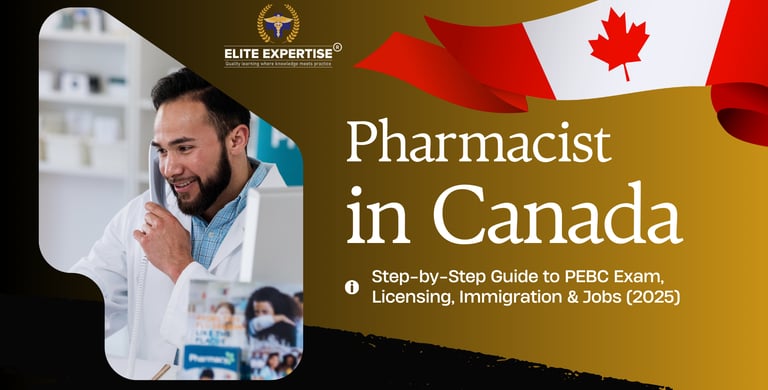ASK MY PHARMACIST | GOT QUESTIONS? Your pharmacist has answers. Click Here
Pharmacist in Canada: Step-by-Step Guide to PEBC Exam, Licensing, Immigration & Jobs (2025)
Step-by-step guide for international pharmacists to work in Canada. Learn about PEBC exams, immigration, licensing, and pharmacist job opportunities in 2025.
Sahana
3/20/20256 min read


Why Canada is the Perfect Destination for Pharmacists
Canada welcomes skilled professionals with open arms — especially pharmacists. As the healthcare system expands and the population ages, the country faces a critical shortage of licensed pharmacists, particularly in provinces like Ontario, British Columbia, and Alberta.
Benefits of Working as a Pharmacist in Canada:
Competitive salaries ranging from CAD $70,000 to $155,000
Excellent work-life balance
Pathways to Permanent Residency (PR)
Opportunities in both urban and rural regions
Job Outlook: Strong Demand for Pharmacists (2025 & Beyond)
By 2031, Canada is projected to create over 16,000 new pharmacist positions. The demand is especially high in regions with limited access to healthcare, making rural job placements highly attractive — both financially and professionally.
📍 Hotspot Provinces: Ontario, Alberta, British Columbia
💼 Rural Advantage: Higher chances of job offers, signing bonuses, and immigration support
Pharmacist Salary Expectations in Canada
Pharmacists in Canada earn lucrative salaries. The average salary of an international pharmacist may vary in the range of CAD 70,000 and CAD 155,000 per year based on the province chosen and work experience.
The salary paid also varies with locations or provinces chosen like for Example, a higher pay scale is observed in cities like Toronto and Vancouver due to the cost of living, whereas, additional benefits such as signing bonuses, relocation assistance, and expedited immigration support are the advantages of rural areas.
Are you an international pharmacy graduate dreaming of working in Canada? With a growing demand for healthcare professionals, Canada is an excellent destination for pharmacists looking for stable, high-paying jobs and permanent residency. This guide will take you through every step — from immigration and PEBC licensing to job search strategies and settling into Canadian life.
Whether you're just starting your research or preparing for your move, this blog covers everything you need to know to become a licensed pharmacist in Canada in 2025.
Steps to Become a Licensed Pharmacist in Canada
Let’s understand the steps involved to become a pharmacist in Canada. Like every country, pharmacists must complete a licensing process before practicing in in the country the same is true for Canada true. This process is managed by a regulatory body called Pharmacy Examining Board of Canada (PEBC).
Steps to Get Licensed:
NAPRA ID: Register with the with Pharmacists’ Gateway Canada and get a NAPRA ID.
Document Evaluation: Academic credentials should be submitted to PEBC for assessment.
Evaluating Exam: A multiple-choice exam to test pharmaceutical knowledge.
Qualifying Exam (Part I & II): Also called the MCQ (Part I) or OSCE (Part II) exams which test the theoretical and practical skills.
Provincial Registration: After passing the PEBC exams, register with the pharmacy regulatory body of your chosen province.
Many international pharmacy graduates enroll in bridging programs basis the provincial requirement. This is a mandate in some provinces and these bridging programs are offered by Canadian universities to prepare for these exams and adapt to the Canadian healthcare system but are very expensive.
Immigration Pathways for Pharmacists
1. Express Entry: A Permanent Residency’s fastest route for a candidate
To immigrate to Canada, Express Entry system is one of the most competent ways for skilled professionals, including pharmacists.
This pathway is even more favourable for healthcare professionals with the latest updates from 2025. Pharmacists (NOC 31120, TEER 1) are now included in targeted Express Entry draws, making sure of the quicker processing times.
This means if you qualify under the Federal Skilled Worker Program (FSWP), your application could be prioritized.
Key eligibility factors being, proficiency (IELTS/CELPIP) and Educational Credential Assessment (ECA).
With these changes to the Express entry one can receive an Invitation to Apply (ITA) for permanent residency within months provided you have a strong profile.
2. Provincial Nominee Programs (PNPs): Alternative Immigration Pathways
Provinces in Canada nominate skilled workers based on local labour shortages.
Incase your CRS score is not high enough for Express Entry, you can apply for a Provincial Nominee Program (PNP), which allows Nova Scotia, Ontario, and British Columbia have dedicated healthcare immigration programs.
Another advantage with PNP nomination is that it adds 600 points to your Express Entry profile, almost promising an ITA.
Some provinces offer fast-track work permits to help pharmacists start working in Canada even before getting permanent residency.
How to Secure a Job in Canada Before Arrival
Finding a job before moving can significantly ease your transition. Here are key strategies:
Job Bank Canada, Indeed, and LinkedIn are some of Online Job Portals to explore pharmacy job openings.
By joining professional groups and online forums you can start Networking with Canadian Pharmacists.
Some employers often provide visa sponsorship due to the high demand of pharmacist or shortages in rural areas. Therefore, consider Employer-Sponsored Work Permits.
There are various Virtual Job Fairs that would be conducted by provincial healthcare organizations to connect with recruiters, use them to the fullest.
Making Your Move to Canada Smooth
Settling in can be quite challenging in every new job that we take up so get yourself prepared for it. Once you finish your PEBC exam and complete your immigration process, the next step is settling in. Here’s how to make sure a smooth shift or a transition:
Find Housing Early: Find affordable houses in the areas near your workplace. The rent in Canada varies with the city.
Set Up Your Finances: Open a Canadian bank account and familiarize yourself with tax regulations.
Join Professional Associations: Canadian Pharmacists Association (CPhA) and some other organizations provide networking and career support.
Adjust to Canadian Workplace Culture: Having an eye for local work ethics and understanding the patient care expectations will help you do well professionally.
Why Canada is the Right Choice for You
Canada offers internationally trained pharmacists a clear pathway to permanent residency, high-paying job opportunities, and a strong professional support system.
The PEBC licensing process ensures that you meet Canadian pharmacy standards, and with increasing demand, your skills will be highly valued.
By strategically navigating Express Entry, PNPs, and licensing requirements, you can establish a thriving career in Canada while enjoying the benefits of a stable and fulfilling life.
Difficulties in the path:
The Canadian licensure exam is one of the toughest exams and self-study could make your path considerably difficult. To address this issue, you must consider seeking expert guidance and training.
During the document evaluation process all the document must be submitted as per the requirements mentioned on the PEBC website. Deviation from which could lead to delayed process. An expert advice is always better to make your path easy.
Finding the study material for your preparation is another task considering the vast syllabus.
The OSCE exam simulates the real-life situation which needs a lot of preparation and well experienced mentor for the preparation.:
🎓 Why Choose Elite Expertise:
Online interactive classes
Recorded sessions enabling you to learn at your own pace
Expert guidance from accredited consultant pharmacists Mr Arief Mohammad and Mrs Harika Bheemavarapu, and also, we have a Canadian Pharmacist Shyama making understanding the Canadian laws even more easy
Our curated mocks help you prepare better for your exam day.
All the expertise and experience of the educators (who are pharmacists) at Elite Expertise, teach through case studies making your learning easy to understand.
Final Thoughts:
Canada offers internationally trained pharmacists a clear path to permanent residency, lucrative career options, and a high quality of life. With the right preparation, mentorship, and guidance, you can make your dream of practicing pharmacy in Canada a reality.
Let Elite Expertise be your partner in this life-changing journey. From preparing for the PEBC exam to landing your first job in Canada, we’re with you at every step.
This blog is for informational purposes only and reflects our views and interpretations. While we strive for accuracy, licensing requirements and regulations may change. Readers are advised to verify information with official sources such as the Pharmacy Examining Board of Canada (PEBC) and the National Association of Pharmacy Regulatory Authorities (NAPRA) before making any decisions. We do not assume responsibility for any actions taken based on the information provided.
⚠️ Disclaimer


About the Author
Sahana Rao
Sahana Chinthapatla is renowned for her expertise in scientific and medical writing, backed by an MPharm in Pharmacology and years of experience in research analysis and scientific writing.
As the Head Business Writer at Elite Expertise, she provides insightful and well-researched content on KAPS, OPRA, PEBC, PSI and global pharmacy pathways, guiding aspiring pharmacists in their professional journeys.
Follow On
Head Business Writer | Elite Expertise
Follow Us
+91 76750 84909
Privacy Policy | © 2025 Elite Expertise . All Rights Reserved.
ELITE EXPERTISE PTY. LTD (ABN: 15668292439) (ACN: 668292439)
Australian Statutory Education License: OPP 2025 ELITE EXPERTISE PTY. LTD
Disclaimer
Elite Expertise is an online education platform dedicated solely to providing coaching and preparation services for the OPRA, PEBC, PSI and PTE exams. We do not offer any sponsorship or migration services. All information provided on our platform is for educational purposes only and should not be interpreted as legal or immigration advice. For inquiries regarding sponsorship, visa applications, or migration services, please consult with licensed immigration professionals or relevant authorities.
Elite Expertise is a trusted and results-driven training platform specializing in preparation for international pharmacist licensing exams. Our comprehensive courses, expert instructors, and proven methodologies have helped countless pharmacy professionals achieve their goals and succeed in competitive regulatory exams. We are proud of our strong success rate and commitment to excellence.
Elite Expertise is an independent training provider. We are not affiliated with any global pharmacy regulatory authorities or official exam-conducting bodies.
Copyright © 2026 Elite Expertise. All rights reserved.
Address
Unit 1/73 Beverley St, Doncaster East VIC 3109, Australia
